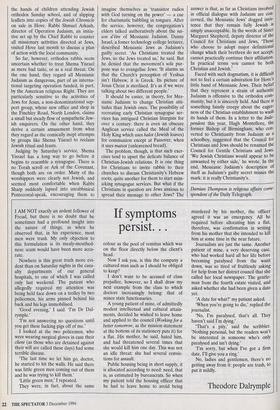If symptoms persist. . .
I AM NOT exactly an ardent follower of Freud, but there is no doubt that he sometimes had a profound insight into the nature of things, as when he observed that, in his experience, most men were trash. My only objection to this formulation is its mealy-mouthed- ness: scum would have been more accu- rate.
Nowhere is this great truth more evi- dent than on Saturday nights in the casu- alty departments of our general hospitals, to one of which I was called only last weekend. The patient who allegedly required my attention was being held face down on a trolley by two policemen, his arms pinned behind his back and his legs immobilised.
'Good evening,' I said. 'I'm Dr Dal- rymple.'
'I'm not answering no questions until you get these fucking pigs off of me.'
I looked at the two policemen, who were wearing surgical gloves in case their client (as those who are detained against their will are called these days) had some terrible disease.
The last time we let him go, doctor, he started to hit the walls. He said there was little green men coming out of them and he was trying to kill them.'
'Little green men,' I repeated.
They were, in fact, about the same colour as the pool of vomitus which was on the floor directly below the client's head.
Now I ask you, is this the company a cultured man such as I should be obliged to keep?
I don't want to be accused of class prejudice, however, so I shall draw my next example from the class to which doctors increasingly belong: that of minor state functionaries.
A young patient of mine, of admittedly modest intellectual and cultural attain- ments, decided he wished to leave home and applied to the council (Working for a better tomorrow, as the mission statement at the bottom of its stationery puts it) for a flat. His mother, he said, hated him, and had threatened several times that she would kill him one day. This was not an idle threat: she had several convic- tions for assault.
Public housing being in short supply, it is allocated according to need: need, that is, as estimated by bureaucrats. So when my patient told the housing officer that he had to leave home to avoid being murdered by his mother, the officer agreed it was an emergency. All he required before allocating him a flat, therefore, was confirmation in writing from his mother that she intended to kill him at some time in the near future.
Journalists are just the same. Another patient of mine, a very deserving case, who had worked hard all her life before becoming paralysed from the waist down, was so tired of fruitlessly asking for help from her district council that she called her local newspaper. The gentle- man from the fourth estate visited, and asked whether she had been given a date yet.
'A date for what?' my patient asked. 'When you're going to die,' replied the journalist.
'No, I'm paralysed, that's all. They haven't said I'm dying.'
'That's a pity,' said the scribbler. 'Nothing personal, but the readers won't be interested in someone who's only paralysed and isn't dying.'
'I'm sorry, but when I've got a firm date, I'll give you a ring.' No, ladies and gentlemen, there's no getting away from it: people are trash, to put it mildly.
Theodore Dalrymple










































































 Previous page
Previous page